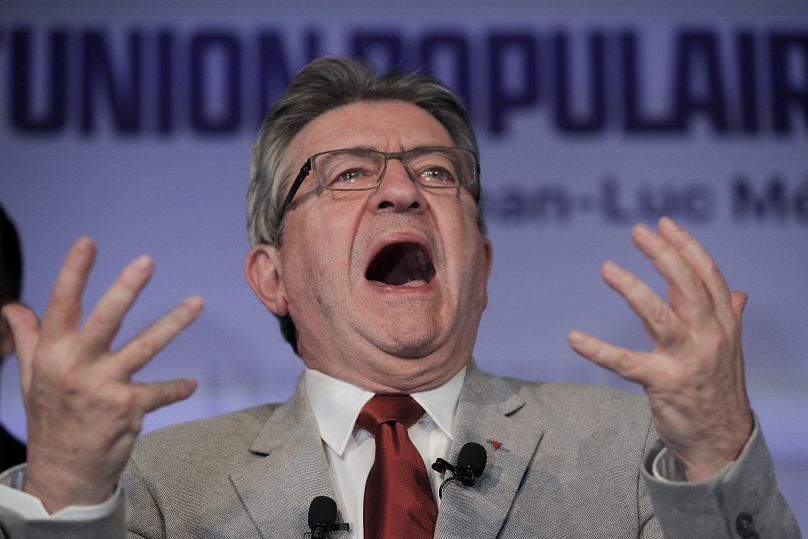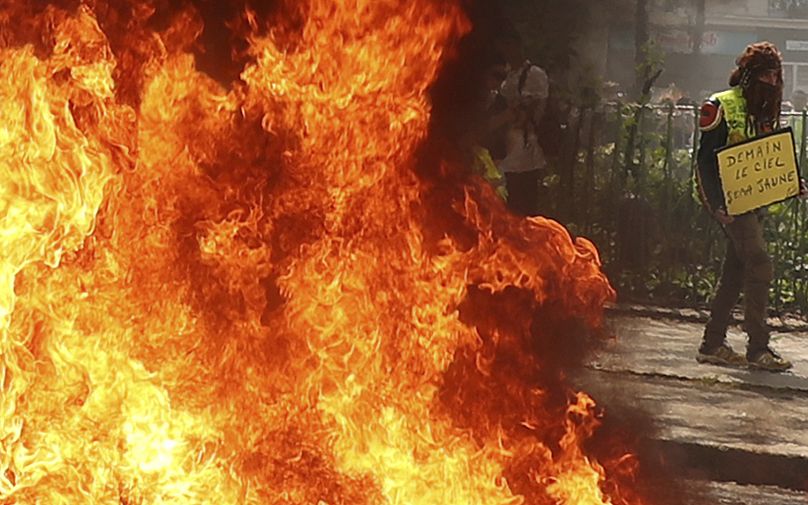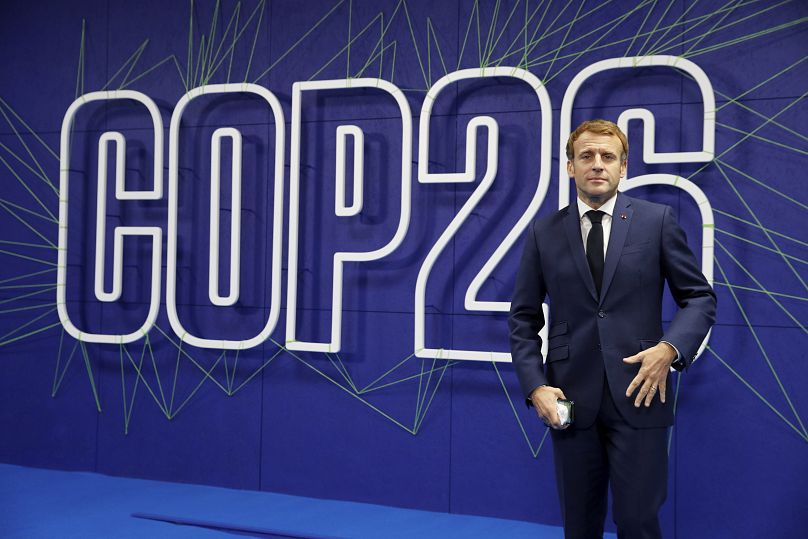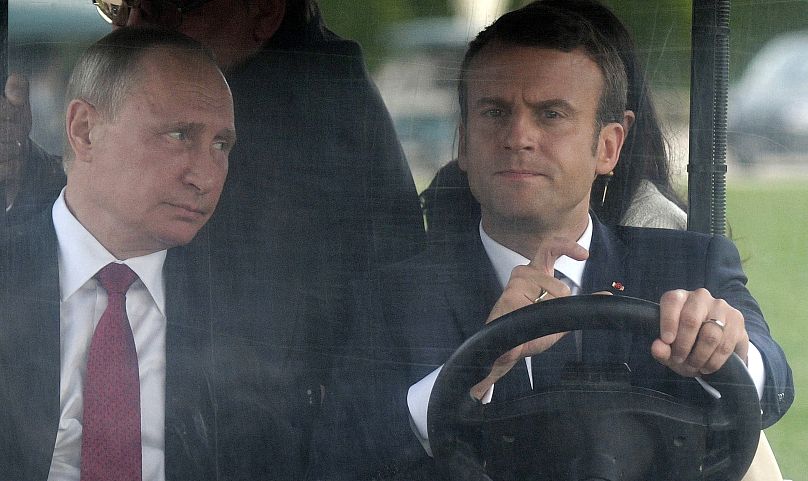Emmanuel Macron is toasting being re-elected as France's president. But when reality bites, the challenges are already piling up.
Emmanuel Macron’s victory in the French presidential run-off will be a relief to all those who feared political chaos at home and abroad, had his far-right rival Marine Le Pen won the keys to the Elysee.
But the fact the centrist, pro-European president remains in power does not herald a smooth ride ahead.
France remains a divided country and despite his win, Macron remains a deeply unpopular figure among a large proportion of the population.
The president’s first term was marked by the “gilets jaunes” (“yellow vests”) protests, some of which bordered on an insurrection. It was buffeted by the Trump presidency, Brexit, further upturned by the Covid pandemic and finally the Ukraine war.
Macron’s second term may be every bit as daunting. Euronews takes a look at some of the challenges ahead.
1. He needs a majority in parliament
First of all the president needs a new majority government. The country votes again in June in parliamentary elections. In 2017 Macron won a landslide off the back of his presidential win against a demoralised opposition, especially among the traditional left and right.
In 2022 he faces a stiff challenge, not least from the hard left “La France Insoumise” (“France Unbowed”) movement of Jean-Luc Mélenchon, who finished a strong third in the presidential vote opening round.
Mélenchon has already set out his stall for the legislative battle ahead, cheekily daring the president to name him prime minister.
However, Macron could benefit from the electoral process, which for the parliamentary elections is also spread over two rounds. In the contest for the Elysee, he already hoovered up many votes from the now-shattered centre-right and centre-left establishment at the first attempt.
Another factor in his favour could be that Le Pen’s presidential threat may not be repeated in the parliamentary vote, as the far-right looks set to be divided between her camp and that of the nostalgic authoritarian Eric Zemmour.
"I think (Macron) will do very well, relatively well in the elections in June. He won't do as well or win as decisively as he won the last time. The last time he was new if you like, he didn't have to run on his record,” Douglas Webber, emeritus professor at the INSEAD business school, told Euronews.
“In order to build a majority in the parliament, he'll probably need to find support from some other political parties, and he may find enough MPs to back him from amongst the mainstream right and elements also of the more moderate left, as well, the remnants of the Socialist Party and especially the remnants of the Republicans.”
2. Macron may face a backlash, despite his victory
Macron won the presidency thanks in part to extra votes “lent” to him to keep Le Pen out, despite a backlash against the so-called “Republican front” that united to reject her father 20 years ago.
Many on the left, whether they reluctantly voted for Macron or not on Sunday, maybe even more resentful of the man in the Elysee as he settles in for a second term.
The first round of the presidential election confirmed three newly entrenched blocs in France's new political landscape: Macron's pro-European centrists, Le Pen's nationalist insurgency, and Mélenchon's hard left.
Broadly, each has the backing of around a third of the public. The "left" and the "nationalist" share little in common other than hostility to the president, his movement and the establishment. The opposition of two-thirds of voters will not make for easy government.
“France will remain a deeply divided country. Macron can rely on, or has the support of, fewer than one French voter out of every three, 28%, 27% in the first round,” Webber says.
The president has already said he intends to begin pension reform from the autumn, aiming to raise the legal retirement age to 65 – although during the campaign he vowed to be flexible. If France-watchers are looking for an issue to spark another wave of protests, this is an easy tip.
Webber says Macron will struggle to get far in implementing his domestic political agenda and make radical changes.
“Even if he has a majority in the parliament for major projects like the reform of the pension system, he's likely to be confronted by very strong opposition outside of parliament in the form of protest movements, such as those that were against reform protests also during these last five years. So one might see a revival of the ‘yellow vest’ movement if in particular, the cost of living keeps rising or accelerates.”
3. 'Complete renewal’ of France's climate policy
In a barely concealed attempt to woo voters on the left between the two rounds, Emmanuel Macron promised an overhaul of climate policy before a crowd of supporters in Marseille.
The next prime minister would have direct responsibility for environmental planning, he said, backed up by two ministers to oversee the green transition and implementation – an idea very similar to one proposed by Mélenchon.
Macron rattled through the other main elements of his manifesto: energy conservation, nuclear power (six new-generation reactors with studies launched for eight more), big investment in renewable energy with 50 wind farms at sea by 2050, more rail and river freight, tackling air pollution, tree planting.
The president also wants to develop an exclusively French electric car sector with easier access via a leasing programme. There would even be an annual "Fête de la nature" based on the successful long-established musical model.
Environmental campaigners question Macron’s sincerity, having branded him the “president of climate inaction” or the “president of little steps” during his first term. Both he and Le Pen were criticised for failing to address some green issues at all during their TV debate.
4. Ambitious reform of the EU
Deeper European integration has been a key theme for Emmanuel Macron since his election in 2017, when his victory rally echoed to Beethoven’s Ode to Joy, the European Union anthem.
This time, though he perhaps banged the European drum a little less during the campaign, the president describes his programme as one of “national and European sovereignty”.
His European ambitions include “energy and strategic” autonomy, a reform of the Schengen free-movement zone with better protection of the EU’s external borders, and a common asylum policy. Macron also wants European countries to develop a stronger defence capacity, and a concrete drive to boost the European tech industry.
To relaunch the economy, Macron proposes measures with a social and economic dimension: an EU-wide fuel tax, EU standards enforced in trade deals as well as a directive on a minimum wage and gender equality.
Finally, for young people he and the European Commission want to develop a six-month civic European service programme offering academic or vocational exchanges, or charity work.
5. Ukraine war balancing act
Emmanuel Macron has backed EU sanctions against Russia over the Ukraine war, his government saying it will consider a ban on Russian oil imports. The president described Russian atrocities in Bucha as “war crimes” and called for perpetrators to be brought to justice internationally.
Yet he has always advocated dialogue with Moscow, backed by “firmness’. Barely three weeks after Macron’s election victory in 2017, Vladimir Putin came to Versailles amid much pomp and ceremony, despite tensions over Syria and Ukraine. He also visited the French president’s summer residence in the south of France, ahead of a G7 summit.
Such meetings failed to ease tensions in the long term. Nor did Macron’s multiple phone calls with his Russian counterpart last winter, as Moscow’s forces amassed at Ukraine’s borders, stop Russia from going to war.
On Friday, the French president told French radio he “does not rule out” speaking to Putin again, while acknowledging that the goal may be relatively modest, such as obtaining humanitarian access for Mariupol.
Warning against a permanent rupture in relations, he cites the need for influence in the event of a ceasefire. “Europe must be at the table. We must all be very vigilant. We mustn’t find ourselves in a situation where, because we had decided no longer to speak to President Putin, the negotiators will be the Turkish or Chinese presidents, or others,” he said on France Inter.
Macron says France and Europe should take care to avoid direct military engagement in Ukraine, which he argues would be seen as escalating the conflict or even starting a “new world war”. Sending tanks or planes would be “co-belligerence”, he says.















